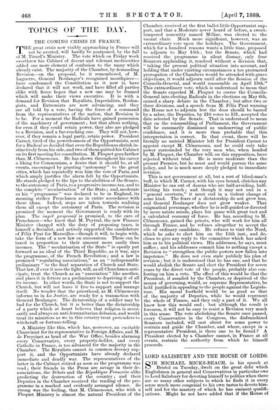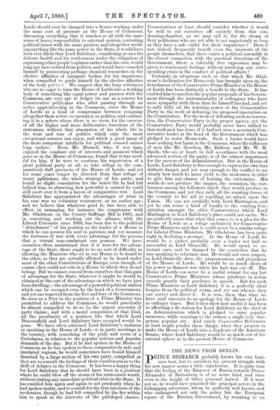LORD SALISBURY AND THE HOUSE OF LORDS.
SIR miaFrAEL HICKS-BEACH, in his speech at Bristol on Tuesday, dwelt on the great debt which Englishmen in general and Conservatives in particular owe to Lord Salisbury for devoting himself to politics when there are so many other subjects to which he finds it in every sense much more congenial to his own tastes to devote him- self and for the mastery of which he has eminent qualifi-, cations. Might he not have added that if the House of Conservatives at least should consider whether it would be well to cut ourselves off entirely from this con- densing-chamber, as we may call it, for the steam of fiery politicians who are yet able to act sagaciously so long as they have a safe outlet for their impatience ? Does it not, indeed, frequently benefit even the interests of the people themselves, that there exists a political assembly in the closest connection with the practical functions of the Government, where a tolerably free expression may be given to reactionary feelings without involving any corre- sponding crisis in the conduct of political affairs ?
Certainly, in situations such as that which Mr. Glad- stone's declaration for Home-rule has brought upon us, the detachment of the Conservative Prime Minister in the House of Lords has been distinctly a benefit to the State. It has enabled him to sanction the popular proposals of his Govern- ment through the instrumentality of colleagues who have more sympathy with them than he himself has had, and yet to rally fully all the resisting power of the Conservative Party to the work of defeating the proposed innovation on the Constitution. For the work of defeating such an innova- tion, the Conservative Party is the proper agency, yet the Conservative Party would probably never have rallied to that work as it has done, if it had not seen a genuinely Con- servative leader at the head of the Government which was pledged to resist Home-rule. Such a leader would have done nothing but harm in the Commons, where the influence of men like Mr. Goschen, Mr. Balfour, and Mr. W. H. Smith, who are at heart in full accordance with the most advanced section of the party, is of the utmost importance for the success of the Administration. But in the House of Lords, Lord Salisbury is free enough to express his own bias without danger, and yet near enough to the conflict to see clearly how much he must yield to the moderates in order to give him any chance of beating the extremists. His words do not produce the impact, the sensation, the rest- lessness among his followers which they would produce in the Commons, and yet they rally all the resisting forces of the country to his aid in repelling an attack upon the Union. He can act cordially with Lord Hartington, and. yet he can rouse a kind of loyalty to the existing Con- stitution amongst the older Conservatives which Lord Hartington in Lord Salisbury's place could not excite. We are perfectly aware that what this comes to is a plea for the House of Lords as a refuge exclusively for Conservative- Prime Ministers, and that it could never be a similar refuge for Liberal Prime Ministers. Mr. Gladstone has been quite. right in declining a peerage. In the House of Lords he would be a cipher, probably even a leader not half so successful as Lord Granville. He would speak to re- luctant ears, and be damped by the conviction that he was speaking to reluctant ears. He would not even respect, as Lord Granville does, the prepossessions and prejudices of the House of Lords. He would be as much shorn of his power as Samson was when his hair was cut off. The House of Lords can never be a useful retreat for any but Conservative Prime Ministers whose prudence in action exceeds greatly their prudence in speech. But for such Prime Ministers as Lord Salisbury it is a perfectly ideal hospice from the political storm, and yet one whence they can survey and direct it. It is true, then, that what we have said amounts to no apology for the House of Lords in ordinary times. But it does show how useful it has been in affording a fit station for Lord Salisbury as the chief of an Administration which is pledged to carry popular measures, while resisting to the utmost a single very dan- gerous popular cry. And surely Conservative Reformers at least might ponder these things, when they propose to make the House of Lords into a duplicate of the American Senate, where Lord Salisbury would be as much out of his natural sphere as in the present House of Commons.



































 Previous page
Previous page